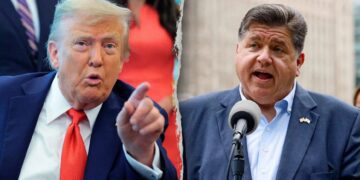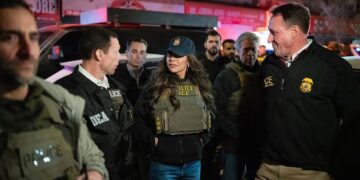By John F. Di Leo -
photos by Mark Weyermuller
Looking back at the Founding Era after 250 years, we often think of the challenges the Framers faced. A single legislature, or a bicameral arrangement? A strong head of state or a figurehead… or none at all? How often should terms last?
What we tend to forget is that the first debate, before they could even get started in planning all this in the summer of 1787, was the question of whether any of it was possible at all.
Our Founding Fathers were educated in the history of government; they had studied political science for years, even decades. And there were two conclusions that seemed almost certain, and had been agreed-upon for centuries: First, that direct democracy can only work in the smallest of towns, and second, that even a representative republic could probably work as a city-state or similarly small country, but most likely couldn’t be successful in a large nation… because you could never know your representative personally, if the country was too large.
During the Founding Era, the United States were thirteen independent countries – members of a federation, but really not a true nation. The challenge of the Framers, that summer in Philadelphia, was to find some way to function as a single nation, so that our individual member states wouldn’t get picked off, one by one, by powerful foreign enemies… without losing the legitimate representation that we had just fought a world war to win.
Members of the Continental Congress and Confederation Congress, during the fifteen years that preceded the Constitution, were themselves state legislators, elected after they had ridden around their districts, meeting prominent farmers and businessmen in person, and speaking at public forums and other town meetings. They were used to the voters knowing who they were voting for.
How could this be done at the national level, in a nation of already four million people, sure to grow? (They were right; we grew from four million to seventeen million in just our first 50 years.) How could we design a system in which you could know your congressman or senator personally, well enough to cast a vote to entrust him with your taxes, your necessary government services, and your country’s security?
To an extent, the Founders answered with a hybrid solution, by hoping that the voters could get to know their state legislators and their federal congressmen, then their state legislators would, in different ways, choose their US senators and their president.
But even this was sure to be a challenge as the population skyrocketed, so the Founding generation learned to embrace parties, which they had originally dismissed as undesirable and divisive “factions.”
The Party Meeting
For over two hundred years, our local political parties have been the path, not just for election of our representatives, but also, for their constituents to meet them, to get to know them… to get that feel for how a person really ticks, that you don’t get from brochures and commercials. The monthly meetings of these local party organizations would provide the opportunity to see your reps regularly, and to meet new candidates as their careers began or expanded. With years of participation at such meetings, even today, the interested citizen can indeed be on a first-name basis with his government, as the Founders hoped.
The New Trier Republican Organization (NTRO), which represents the northern suburbs of Chicagoland, from the northern border of Evanston up to the Lake County line, is in the midst of holding a series of public meetings, introducing the various candidates for the Republican nomination for Governor in 2022 (they have not yet held any endorsement sessions; the final field isn't even known yet).
NTRO held just such a meet-and-greet this Saturday, January 22, and Illinois Review was there.
It began, as such events do, with the attendees milling about, many catching up with old friends, since public meetings have become so rare since the China Virus was unleashed on the world. This also gave people a chance to meet the candidate, one-on-one, before hearing him speak.
The guest speaker this Saturday was State Senator Darren Bailey, who represents a district in southeastern Illinois. Such a district is another world, compared to our geographically small, densely populated urban and suburban districts in the Chicagoland metro.
Darren Bailey’s 55th State Senate district is an hour across, from west to east, and two full hours drive from north to south, covering a section both south and east of our state capitol, along Illinois’s eastern boundary. To win a seat in such an agricultural area, a candidate must be engaged in the community, and must drive around the district – a lot – to keep connected to his constituents.
Such a district, one cannot help but realize, is reminiscent of life in America during the Founding Era, when the nation was overwhelmingly agricultural. Senator Bailey has a relationship with his voters that readers of history might recognize from biographies of Washington and Madison.
The local host, Jasmine Hauser, introduced Senator Bailey by enthusiastically sharing her experience in working with him on the project to Reopen Illinois that he launched in 2020.
Bailey was a state representative when the virus hit, and he was an early opponent of incumbent Governor J.B. Pritzker’s numerous mandates. Arguing that such mandates were not only bad policy, but unconstitutionally excessive as well, Bailey filed suit against the governor, denying the governor any such power to issue these unending executive orders. Bailey won the suit in court (in case you’re wondering, it has never been overturned), and he has led rallies on the matter, in an effort to restore individual choice in this age of compulsory mask-wearing, vaccine use, and business shutdowns.
Bailey therefore became an early hero in Illinois, as patriots watched the nation split into camps – the mask states and the free states; the blue states and the red states.
So it was with a glowing introduction and a wave of one of his signs that Senator Bailey stepped up to greet this room of about 45 to 50 attendees.
State Senator Darren Bailey
Some races are between known quantities. By the time they were elected president, for example, Ronald Reagan, both George Bushes, and Donald Trump had been known to most voters for decades, if not their entire lives.
Darren Bailey, however, is unknown to most Illinoisans, or at least, he was unknown until his activism during the pandemic. So, he had to begin with a big of a life story.
He travels with his wife, Cindy, and that’s an important part of the tale. They dated in high school, married in college, built a farming business together, became parents and grandparents together. Their sons are now partners in their farming and trucking business.
He spent about seventeen years on his local school board, twelve years as the board’s president, and since this is the lion’s share of his government service, he proudly spent some time talking about his accomplishments on that board.
Bailey was an early fan of activist Adam Andrzejewski’s efforts to “open the books” at the local government level in Illinois. He boasts that his district was the first school board in the state to proudly post its entire budget on the district website (despite it having been state law for some time, he says, no other district had actually obeyed the rule until his).
Illinois is well known across the country for its broad support of education: traditionally, public schools, private schools, and homeschooling are all treated with respect under the law. Having demonstrated his strong support for running public schools well, Bailey got involved in the homeschooling movement and co-founded a local Christian school in 2016. The Full Armor Christian Academy runs from pre-K through grade 12. His wife, Cindy Bailey, serves as the school’s executive director.
It was Darren Bailey’s horror at the proposed state budget in 2017 that prompted him to return to public service by running for state rep in 2018. He fought against the Pritzker “Fair Tax” (which he reminded us was anything but fair, and which the voters soundly defeated), and he moved up to the state senate after just one term in the house, with the election of 2020.
In this mini-review of his own biography, the senator reminded the crowd of the pressure that the Democrat powerhouses in Springfield are able to apply to their minority Republican colleagues.
If they want a Republican vote – for a gas tax increase, for example – they will dangle in-district projects in front of their eyes. It’s not a bribe – they’re offering to do something for his district, not for him – but the end result is awfully similar, isn’t it? “You don’t want this gas tax… sure… but it’s going to pass anyway, so why not play ball? If you vote with us, we’ll put a bridge project in your district, or a road resurfacing or something…” Why not? Bailey won’t play ball, but now you can see how so many do, and how bad bills can get labeled as “bipartisan” when they really weren’t.
This is the kind of story that helps an audience understand both the individual politician’s frame of mind, and also, the deep level of dishonesty – dare we call it corruption? – at the heart of Illinois’ state government.
Another useful story was that of one of the first bills he proposed upon his arrival in Springfield. He proposed that parents always be provided with the description, ingredients, and side effects of vaccines that our schools encourage for their children. It wasn’t an opposition to vaccines (and remember, this was a year before the China virus hit), just another manifestation of Bailey’s commitment to openness, to full disclosure by government, just as he supported in the school board, years ago.
A recurring theme in his presentation was the size of our state’s budget, and the complexity behind every line item. It’s not enough to question an expenditure; fair assessment requires digging into the expenditure and understanding whether the funding is already there, or if funding requires a tax increase or an unlikely expectation, or it’s dependent upon some future tax increase or bond issue.
He stressed the precarious nature of our state’s current finances, and how our bond rating would already be “junk” were it not for the huge federal Covid grants from the federal government, which the Democrats hoped would prop up the state, somehow, until after the next election.
A personal note: This too was interesting, I think, to most attendees, not just to me: I expect a solid conservative to be more adamant, more dismissive of the corrupt left and their positions. Bailey gives the impression of being a principled man, but reasonable in his approach. On the pension question, for example, he didn’t say “here’s my approach, we have to make them take it;” rather, he said he wants to sit down with the state workers, honor the existing commitments, put us on a path to funding those commitments, and find a way to fairly, honorably end the problem for future generations by putting new hires on 401K programs. He’s open, acknowledging the challenge but promising flexibility, while insisting that we stop kicking the can down the road. With so many Republican proposals “dead on arrival” in Springfield, this makes sense.
He spent a few minutes of his limited time on a bit of analysis of the votes against Pritzker’s Fair Tax. Bailey stressed that, logically, every anti- Fair Tax vote should be a Republican vote, and yet, lots of Democrats won districts that went overwhelmingly against the Fair Tax… sometimes because the GOP didn’t even run assembly candidates in districts that voted right on the issue. He said the winning candidate, not just for governor but for all offices, is the one who understands this, and reaches the people on the basis of their correct instincts on the issues that matter.
Can He Win?
In the general election in November, there is only one question on the mind of the voter: Should he win? That is, which candidate is the one who belongs in that seat?
In a primary, however, the voter (and the activist, and the donor) have two questions. In addition to “Should he win,” we must ask, “Can he win?”
This is harder for an Illinois Republican than for an Illinois Democrat. The Democrats have a strong edge in Illinois, with not only an incredible voter registration advantage, but also money, power, and custom.
This advantage isn’t statewide, by any means; most of Illinois is solidly conservative Republican… but the Democrat strongholds, especially in Cook County, can appear insurmountable.
So we look at our candidates and we ask ourselves, which ones can win votes all over the state? Can they raise enough money to compete with a hereditary billionaire? Can they build a coalition of activists to spread the word through endorsements, personal mailings, bumper stickers and yard signs? Can they hold the base, perhaps peel off some Democrats, and win a majority of independents?
This is where it gets difficult to predict, especially in this case. We’re used to governors “looking like governors” (or, should we say, like we expect governors to dress).
Should a governor wear a navy blue suit and talk with a midwest/northern accent? If so, then Darren Bailey poses a challenge. He’s a successful downstate farmer, clearly most comfortable in jeans, with sports shirt and vest, and his southern Illinois accent is undeniable.
But then, we also challenge ourselves on how the state has been doing lately, as Chicagoland governors have led (or been led by) a Chicagoland-ruled legislature, and the state has plummeted ever further into a fiscal abyss under their rule.
Residents are fleeing; businesses are fleeing. As employers run away, so must their employees. Despite a shrinking tax base, the Democrats in charge just propose ever-higher tax rates and ever-higher spending plans. As these two choices grow more and more divergent, they float more bonds and underfund the pensions even more.
Perhaps it is time that we get over our discomfort with the superficial, and remember that Illinois is, after all, first and foremost, an agricultural state. Maybe some of our problems are rooted in the fact that we’ve forgotten this, and we’ve allowed a corrupt big city to abuse and take advantage of a stateful of honest farmers for way too long.
Chicago is good at a lot of things. Chicago knows how to build great buildings, great businesses, great restaurants, great museums, great theaters. We are a world-famous tourism and transportation destination; nobody’s going to challenge Chicago’s abilities in architecture, pizza making, or the arts.
But just as Chicago has its talents, there are other talents that come from the south. As we see from the economic powerhouses of Florida and Texas, the skills of administering an honest and successful government seem to come more naturally to those with a southern accent.
In 2022, perhaps we have an opportunity to preserve what Chicago is good at, and cut down on the influence of Chicago’s greatest vices. Saving the state from Chicago will, after all, save Chicgo too.
Choosing a down-stater for Governor, and perhaps restoring the Founding Fathers’ natural vision of the “agrarian citizen politician” – one with more respect for Constitutionally-limited government than we will ever see from Chicago politicians – just might be the right way to go in 2022.
Copyright 2022 John F. Di Leo
(photo credits: Mark Weyermuller, for Illinois Review)
John F. Di Leo is a Chicagoland-based trade compliance trainer and transportation manager, writer and actor. A one-time county chairman of the Milwaukee County Republican Party, he has been writing regularly for Illinois Review since 2009.
A collection of John’s Illinois Review articles about vote fraud, The Tales of Little Pavel, and his 2021 political satires about current events, Evening Soup with Basement Joe, Volumes One and Two, are available, in either paperback or eBook, only on Amazon.
Don’t miss an article! Use the free tool in the margin to sign up for Illinois reviews free email notification service, so that you always know when we publish new content!














